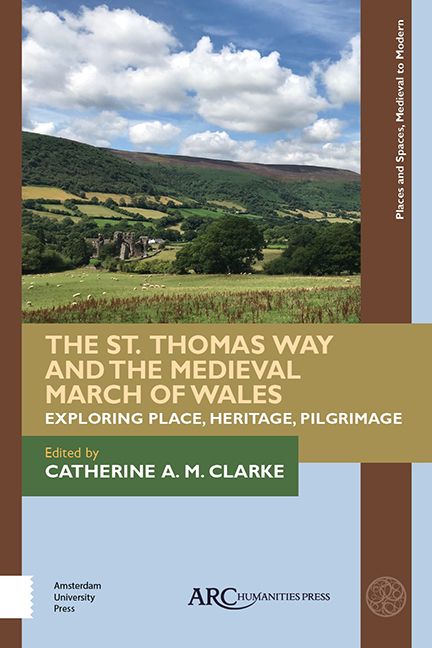Introduction: Remaking Medieval Pilgrimage—The St. Thomas Way
Published online by Cambridge University Press: 20 November 2020
Summary
THE ST. THOMAS Way is a new heritage route from Swansea to Hereford, inspired by a real medieval pilgrimage. Launched in 2018, the route is built around thirteen core locations, and interactive, multimedia online resources at www.thomasway.ac.uk. In 1290, a Welsh outlaw, William Cragh, was hanged in Swansea by the Anglo-Norman Marcher Lord of Gower, William de Briouze. But after his execution, Cragh came back to life, in what was understood as a miracle of Thomas de Cantilupe, the former Bishop of Hereford (died 1282). The St. Thomas Way project had a variety of aims across two broad areas: to share new research on the case of William Cragh, Thomas de Cantilupe, and the geographical and cultural landscapes of the medieval March of Wales with wide public audiences; and to contribute to cultural and economic development in the England– Wales border region today, through tourism capacity-building, placemaking, and partnerships with local communities, institutions, and businesses.
Funded by the UK Arts and Humanities Research Council (AHRC), under their “Follow-on Funding for Impact and Engagement” scheme, the St. Thomas Way project was initially conceived and designed in terms of research dissemination, and the achievement of positive cultural and economic “impacts” or benefits, beyond academia. But the development of the Way has also opened up new research questions and directions for scholarly exploration, which extend beyond this project into broader areas of enquiry across medieval studies, heritage studies, digital humanities, and critical theory. Through practice-led and applied research— as well as critical analysis and interrogation of the methodologies, implications, and ethics of the Way's content and representational modes— the project has animated new approaches to a range of important, often urgent, questions across a variety of fields. The St. Thomas Way project has brought new perspectives to current scholarly conversations around spatial imaginaries medieval and modern, and ideas of place and journeying in the Middle Ages and today. It has shed new light on the parallels and differences between medieval pilgrimage and modern tourism practices, as well as processes of remembering, commemoration, and heritage management. The project has enlarged and nuanced debates about relationships between place and time, and the varied ways of approaching temporality or multiple temporalities.
- Type
- Chapter
- Information
- The St. Thomas Way and the Medieval March of WalesExploring Place, Heritage, Pilgrimage, pp. 1 - 22Publisher: Amsterdam University PressPrint publication year: 2020



